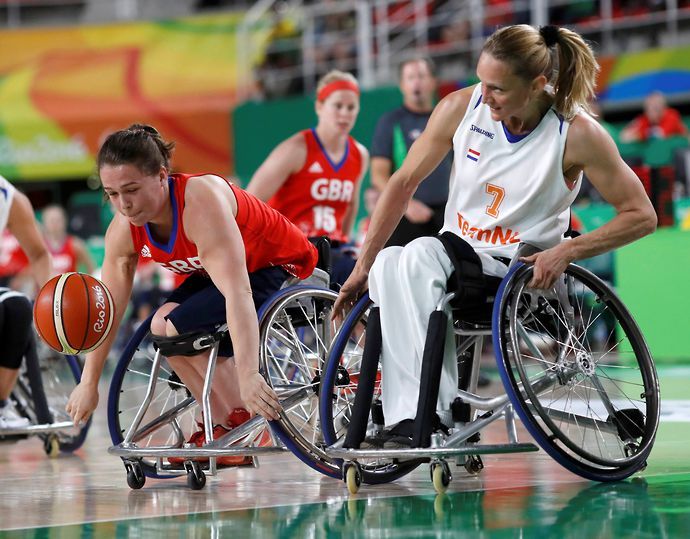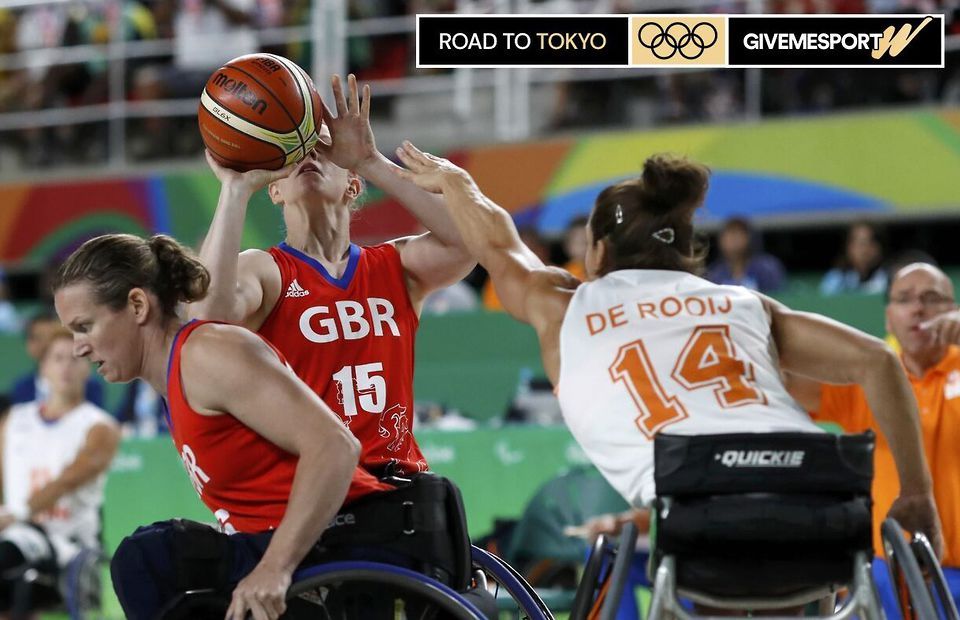In our latest exclusive interview for our Road to Tokyo series, GiveMeSport Women caught up with British wheelchair basketball player Robyn Love as she prepares for her second Paralympic Games.Love will fly out to Tokyo this summer with a Paralympic Games already under her belt, but the environment is set to be very different to that at Rio 2016. Numerous regulations will be in place as a result of the COVID-19 pandemic, with international spectators already confirmed to be absent.Tokyo 2020 will certainly be different. Love has a pragmatic approach to the Games, however, in no small part due to the experiences of her partner and teammate Laurie Williams, who has already competed at both London 2012 and Rio 2016.“Rio was my first one, and then, obviously, most of our athletes have been to London 2012, my partner Laurie included,” Love explains. “She just said that London was so much better than Rio. For her Rio was a bit of a disappointment in that sense, obviously going to a home Games is just going to be unbelievable.”"So I think for me, I know that it's not going to be the same. I'm happy with that, you know every tournament is different.” Love is also practical about the lack of international spectators, which prevents her friends and family from travelling to Japan to watch the action unfold in person.“Of course, not having fans be able to come over, that's a shame, but at the same time, my mum and dad weren't going to be able to come over anyway,” Love says. “It’s a lot of money to get over to Japan and stay there for a few weeks. Also, you only get to see them for like two minutes, like ‘hi, bye’.“Personally I would feel really bad knowing that they would go all that way, and they couldn’t even see me really. So if anything, it might be a weight of people’s minds.“We know that when we get home, they're going to be at the airport, or welcoming us home, and I'm sure we'll do something special, as a wheelchair basketball family.“But for me personally, I'm happy to just go to the Games, and enjoy it as it is. I think to have expectations with anything at the moment is setting yourself up for failure.
Love is also practical about the lack of international spectators, which prevents her friends and family from travelling to Japan to watch the action unfold in person.“Of course, not having fans be able to come over, that's a shame, but at the same time, my mum and dad weren't going to be able to come over anyway,” Love says. “It’s a lot of money to get over to Japan and stay there for a few weeks. Also, you only get to see them for like two minutes, like ‘hi, bye’.“Personally I would feel really bad knowing that they would go all that way, and they couldn’t even see me really. So if anything, it might be a weight of people’s minds.“We know that when we get home, they're going to be at the airport, or welcoming us home, and I'm sure we'll do something special, as a wheelchair basketball family.“But for me personally, I'm happy to just go to the Games, and enjoy it as it is. I think to have expectations with anything at the moment is setting yourself up for failure.
So, I'm just gonna take everything as it comes, and I honestly think the Japanese are gonna put on a fantastic Games, no matter the restrictions they have.
It is hoped domestic spectators will be able to attend Tokyo 2020 at least. With Britain competing in the Osaka Cup each year, Love has a sound knowledge when it comes to Japanese fans.
“The kids that they get in from the schools are unbelievable, they are just such great spectators,” she laughs. “They really get involved with dancing and cheering you on. I just know, based on my experience, that hopefully if the domestic fans are there [at the Paralympics], it’s going to be a great experience.”
The British women’s basketball team finished in fourth place at Rio 2016, coming agonisingly close to winning a medal. Since then, they have gone on to consolidate themselves as real contenders to place on the podium at Tokyo 2020, clinching a bronze medal at the 2017 European Championships and a silver medal at the 2019 World Championships.
Despite the expectations that could potentially follow Britain to Tokyo, Love reveals she would rather have “tangible, underlying” goals that contribute to an outstanding performance, instead of having a gold medal as the main objective.
The 30-year-old is also confident that preparations for the Games are going well, even with the disruption caused by the pandemic.
“Obviously training is different, but I don't think different always means bad,” Love says.
Our team were very quick when the pandemic hit to adjust and adapt. I think maybe that's part of being involved in Paralympic sport with Paralympic athletes, who have to adapt on a daily basis.
“So, I really feel the staff team and the athletes embraced that change quickly. Really I believe that the preparation we've done so far, I think is better than what we were doing for the first year on the run up to Tokyo.
“We really went from just training hard to training smarter, which you know, I think that's what having a limited time with athletes will do to you. You've got to really break things down and think ‘why are we doing that?’.
“So, I really do think that our coaches are doing a lot better in that sense, we are definitely training a lot smarter. I think we've gone back to basics and, you know, you're never too good to work on the fundamentals. I think that is what we had to work on really.”
For Love, fans should sit down and watch wheelchair basketball at the Paralympics this summer due to its format and the technical attributes needed to compete in the sport at the highest level.
“If you're looking to really follow a team's journey, and really be in amongst it, we're gonna have a game every day. It's not just a one run and you're done, it’s not instant gratification,” she says.
“It’s ups and downs, wins and losses, and it really will be a great emotional roller coaster. It's such a great sport – it's competitive, it's fast, it's dynamic, and the skill level involved is, in my opinion, nothing like any other Paralympic sport.
“In my mind, if you want to see a real diverse range of disabilities put into action and see those people at their best, wheelchair basketball is the place to see it.
“You’ve got people who are paralysed, people who are amputees, to people who have got ACL injuries, to people who have spina bifida or cerebral palsy. There's such a wide range of disabilities, all on one court, and playing together as just this powerhouse. So to me, it’s the best Paralympic sport.”



















